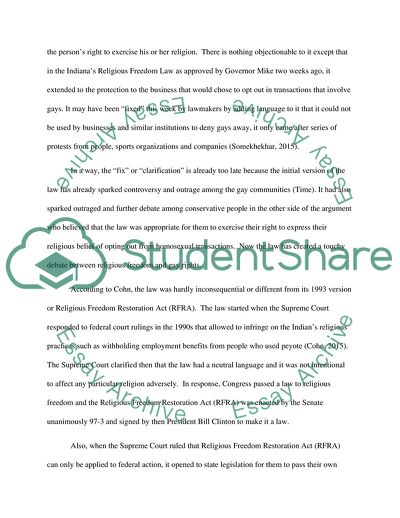Cite this document
(Religious Freedom versus Gay Rights: The Indiana Religious Freedom Law Coursework Example | Topics and Well Written Essays - 1500 words, n.d.)
Religious Freedom versus Gay Rights: The Indiana Religious Freedom Law Coursework Example | Topics and Well Written Essays - 1500 words. https://studentshare.org/social-science/1868678-a-contemporary-controversial-issue-in-the-last-3-months-in-american-or-california-politics
Religious Freedom versus Gay Rights: The Indiana Religious Freedom Law Coursework Example | Topics and Well Written Essays - 1500 words. https://studentshare.org/social-science/1868678-a-contemporary-controversial-issue-in-the-last-3-months-in-american-or-california-politics
(Religious Freedom Versus Gay Rights: The Indiana Religious Freedom Law Coursework Example | Topics and Well Written Essays - 1500 Words)
Religious Freedom Versus Gay Rights: The Indiana Religious Freedom Law Coursework Example | Topics and Well Written Essays - 1500 Words. https://studentshare.org/social-science/1868678-a-contemporary-controversial-issue-in-the-last-3-months-in-american-or-california-politics.
Religious Freedom Versus Gay Rights: The Indiana Religious Freedom Law Coursework Example | Topics and Well Written Essays - 1500 Words. https://studentshare.org/social-science/1868678-a-contemporary-controversial-issue-in-the-last-3-months-in-american-or-california-politics.
“Religious Freedom Versus Gay Rights: The Indiana Religious Freedom Law Coursework Example | Topics and Well Written Essays - 1500 Words”. https://studentshare.org/social-science/1868678-a-contemporary-controversial-issue-in-the-last-3-months-in-american-or-california-politics.


